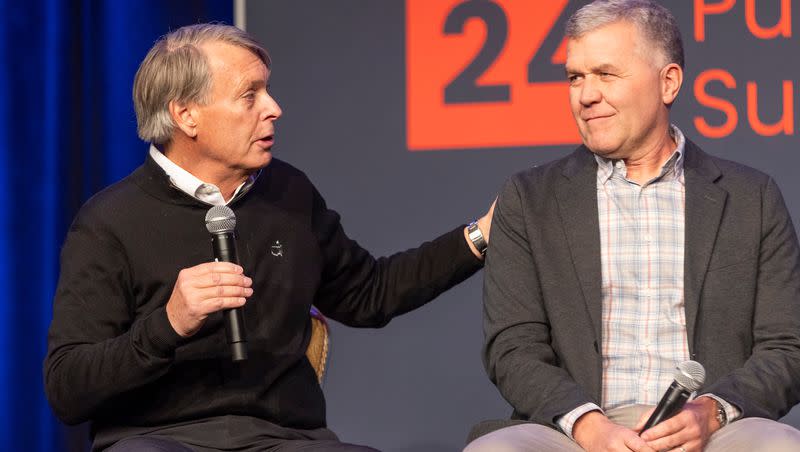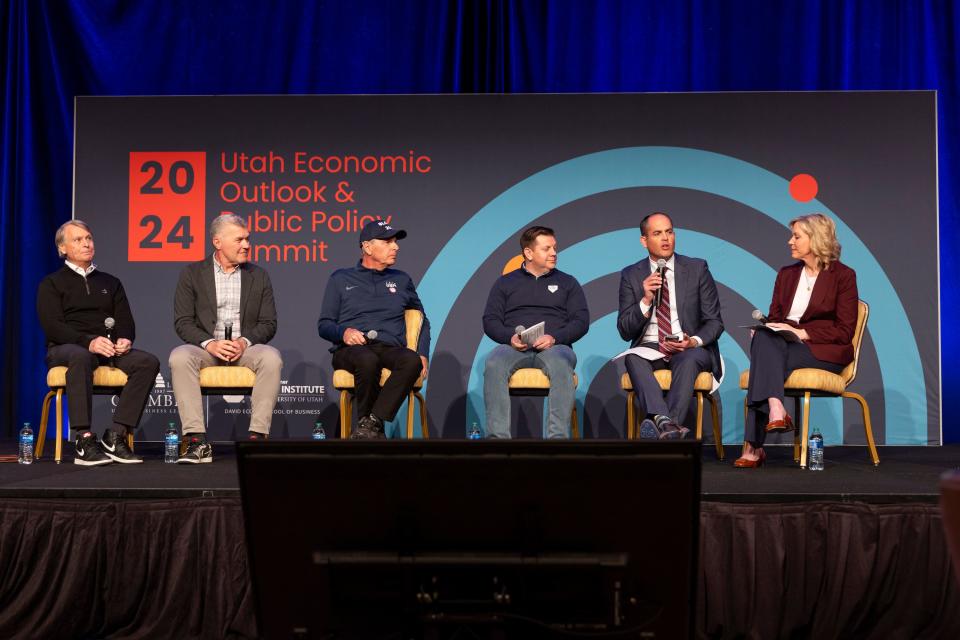Is Utah positioned for a professional sports boom?

Most elected officials in Utah are bullish on efforts in the state to pursue major league baseball and hockey teams along with the Winter Olympics. But there was a time when politicians weren’t on the sports bandwagon.
“It was not long ago when the public sector was not so supportive of sports,” said Jeff Robbins, president and CEO of the Utah Sports Commission.
Speaking on a panel Friday at the Salt Lake Chamber and Kem C. Gardner Policy Institute’s annual Utah Economic Outlook & Public Policy Summit, Robbins recalled conversations with state leaders more than 15 years ago about the economic impacts of new business, tourism and conventions.
“But those are only three legs to the chair,” he said. “Sports is an incredible driver.”
Since then, Robbins said, Utah has developed an “unparalleled” public-private partnership in the sports arena.
“I don’t think anywhere in the world is doing this,” he said. “I think that’s our secret sauce.”
Utah put itself on the world sports map after it successfully hosted the 2002 Winter Games. The Utah Jazz franchise is in its 50th anniversary season.
And now the state is looking to build on those foundations.
Related

Led by the Larry H. Miller Company, a coalition of prominent community leaders and elected officials calling itself Big League Utah is making a case for one of the two possible MLB expansion teams. Utah Jazz owner Ryan Smith is pursuing an NHL team. Salt Lake City is in line to host the Olympics again in 2034.
In addition, 45 cities across the state have hosted big-time sport events from UFC fights to Ironman world championships. Utah also hosted the 2023 NBA All-Star game, which poured $300 million into the state’s economy.
“These are the things Utah is doing with 3 million plus people. You’ve got how many cities in the U.S. that are larger than our state?” Robbins said.
Sen. Mike McKell, R-Spanish Fork, said state lawmakers are supportive of those efforts.
Over the past six years, the Utah Legislature has appropriated more than $94 million to operate, maintain and renovate facilities from the 2002 Winter Games, a total that’s expected to eventually exceed $140 million.
Lawmakers also will consider a resolution supporting major league baseball in Utah during their upcoming general session.
Related
Jim Olson, president of the Utah Jazz, said he doesn’t know if there’s a more exciting time to be part of what’s going on in the state. He also said past investments in amenities such as the Delta Center are catalysts for current and future sports pursuits.
Utah wouldn’t have been in a position to host the 2002 Winter Games if Larry H. Miller hadn’t gone all in on building the Delta Center when he owned the Jazz, Olson said. Smith wouldn’t be in position to talk to the NHL if it weren’t for the success of the Olympics. That goes for baseball, too, he said.
“It just keeps building. ... We’re going to get baseball. We’re going to get hockey. We’re going to bring huge events. Then it’s going to be the 2034 Olympics,” Olson said. “It’s going to continue to just build and build and build. It’s just an incredible story for a state like Utah.”
Fraser Bullock, president and CEO of Salt Lake City-Utah Committee for the Games, said Utah has the best Olympic venues in the world, noting the 2002 Games set aside $76 million to maintain the facilities. Organizers want to leave even a larger endowment after the 2034 Olympics so another generation of young people grow and achieve in those winter sports, he said.
“When we invest in amenities like this we get returns,” said Steve Starks, CEO of the Larry H. Miller Company. “When we invested in the Olympics the first time and the venues, we get the return. Economically, that’s clear but also socially and culturally.”

